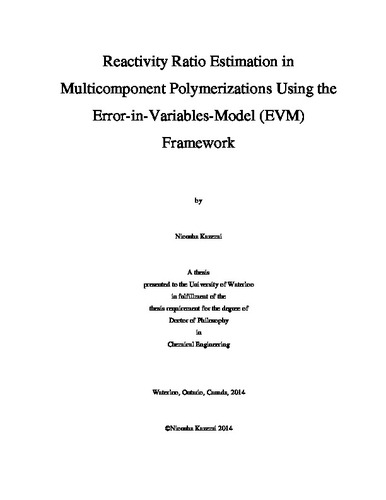| dc.description.abstract | Studying multicomponent polymerizations is an active area of research and one of the most important aspects of such studies is to understand the underlying reaction kinetics. For multicomponent polymerization systems, such as copolymerizations and terpolymerizations, one cannot explain their characteristics only based on information for each individual monomer. In fact, characteristics of such systems depend strongly on the interaction between the various monomers (and their radicals), which is also the key factor in creating diverse polymeric products with versatile properties. One of the basic characteristics of a polymer for specific polymer applications is its polymer composition, influenced by the relative reactivities of the monomers present in the reaction medium. The relative reactivities of monomers are expressed as monomers reactivity ratios. Predicting and controlling polymer composition from the knowledge of monomer concentrations and their reactivity ratios is crucial to research in this field and the polymerization industry due to the clear impact of polymer chain composition on chemical, physical and mechanical properties.
There are several discrepancies and ambiguities in the copolymerization literature regarding the true values of monomer reactivity ratios. This situation is due to the fact that most studies on the kinetics of copolymerization systems have been using statistically incorrect parameter estimation techniques, experimental trials conducted to collect the required data are only at low conversion, and more disturbingly, experimental trials are chosen completely randomly and away from any kind of optimal design of experiments for the purpose of estimating reactivity ratios. For terpolymerizations, despite the importance of the kinetics of terpolymerization reactions, limited research has been conducted to study and estimate ternary reactivity ratios, and mainly reactivity ratios from copolymerization pairs have been used as approximate values for ternary reactivity ratios. For larger multicomponent systems, there are no studies for estimating reactivity ratios whatsoever.
This brings us to a currently observed paradox in the overall picture. There are numerous published experimental studies, with a wealth of experimental information for estimating reactivity ratios; however, almost all existing approaches in this field suffer from oversimplifications and/or violation of certain basic assumptions. The objective is to go through the details of this repeatedly misinterpreted research problem and set the record straight with the use of appropriate choices of data/information and rigorous statistical/numerical techniques.
The parameter estimation technique used in this work is the error-in-variables-model (EVM), since this technique is one of the most general and advanced parameter estimation methods that takes into account the error in all variables involved (i.e., it does not distinguish between dependent and independent variables). This property matches the characteristics of the reactivity ratio estimation problem perfectly. In order to provide a general and complete procedure for estimating reliable reactivity ratios, we have put together the EVM framework that combines parameter estimation and optimal design of experiments, along with full conversion experimentation. The combination of these steps maximizes the amount of information in the experimental data and minimizes the amount of experimental workload. This framework is iterative and sequential and continues until satisfactory results for reactivity ratio estimates are obtained.
With respect to copolymerization reactivity ratios, the EVM framework provides a concrete, superior approach after almost 70 years of fragmented attempts in this area. We have established the utilization of high conversion data for estimating reactivity ratios using a direct numerical integration approach that is not limited to any assumptions, and more importantly, the combination of the design of experiments and parameter estimation steps within the correct EVM context with a sequential scheme that can continue to improve the results for reactivity ratio estimates. All these features provide a solution that has never been implemented before in the literature for this problem, a solution that has a significant effect on the reliability of reactivity ratio estimation results.
Compared to copolymerization systems, our knowledge about the behavior of ternary system with respect to the reactivity ratios of three monomers is at an extremely introductory level, and there are several questions that should be considered about the kinetics of ternary polymerization and the interaction between the three monomers. We have established the correct procedure for estimating ternary reactivity ratios using terpolymerization experimental data directly. Then, the design of experiments step from the EVM framework was implemented on terpolymerization systems, for the first time in the literature. Finally, the performance of the EVM framework on ternary reactivity ratio studies has been illustrated in detail and confirmed experimentally with a novel terpolymerization system of 2-Acrylamido-2-methyl-1-propanesulfonic acid (AMPS)/Acrylamide (AAm)/Acrylic acid (AAc) (a water-soluble terpolymer with applications in enhanced oil recovery and flocculation). Therefore, all the framework steps developed in this thesis for copolymerizations and terpolymerizations have been verified with both extensive simulation studies and experimental data (from the literature and our own). | en |

